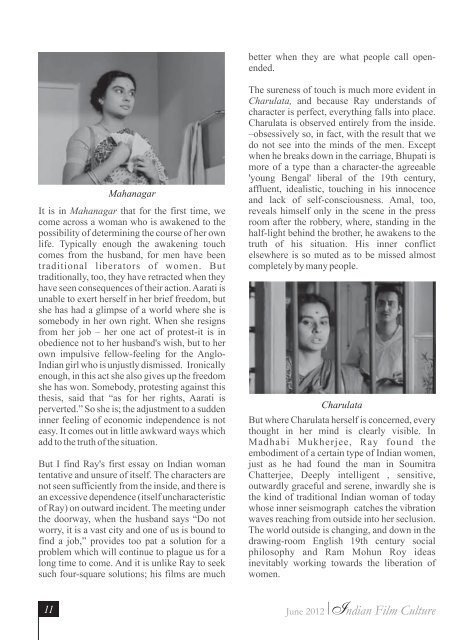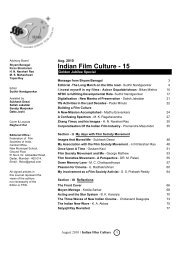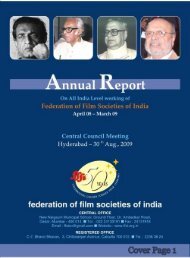Indian Film Culture - 16.cdr - federation of film societies of india
Indian Film Culture - 16.cdr - federation of film societies of india
Indian Film Culture - 16.cdr - federation of film societies of india
Create successful ePaper yourself
Turn your PDF publications into a flip-book with our unique Google optimized e-Paper software.
It is in Mahanagar that for the first time, we<br />
come across a woman who is awakened to the<br />
possibility <strong>of</strong> determining the course <strong>of</strong> her own<br />
life. Typically enough the awakening touch<br />
comes from the husband, for men have been<br />
traditional liberators <strong>of</strong> women. But<br />
traditionally, too, they have retracted when they<br />
have seen consequences <strong>of</strong> their action. Aarati is<br />
unable to exert herself in her brief freedom, but<br />
she has had a glimpse <strong>of</strong> a world where she is<br />
somebody in her own right. When she resigns<br />
from her job – her one act <strong>of</strong> protest-it is in<br />
obedience not to her husband's wish, but to her<br />
own impulsive fellow-feeling for the Anglo-<br />
<strong>Indian</strong> girl who is unjustly dismissed. Ironically<br />
enough, in this act she also gives up the freedom<br />
she has won. Somebody, protesting against this<br />
thesis, said that “as for her rights, Aarati is<br />
perverted.” So she is; the adjustment to a sudden<br />
inner feeling <strong>of</strong> economic independence is not<br />
easy. It comes out in little awkward ways which<br />
add to the truth <strong>of</strong> the situation.<br />
But I find Ray's first essay on <strong>Indian</strong> woman<br />
tentative and unsure <strong>of</strong> itself. The characters are<br />
not seen sufficiently from the inside, and there is<br />
an excessive dependence (itself uncharacteristic<br />
<strong>of</strong> Ray) on outward incident. The meeting under<br />
the doorway, when the husband says “Do not<br />
worry, it is a vast city and one <strong>of</strong> us is bound to<br />
find a job,” provides too pat a solution for a<br />
problem which will continue to plague us for a<br />
long time to come. And it is unlike Ray to seek<br />
such four-square solutions; his <strong>film</strong>s are much<br />
11<br />
Mahanagar<br />
better when they are what people call openended.<br />
The sureness <strong>of</strong> touch is much more evident in<br />
Charulata, and because Ray understands <strong>of</strong><br />
character is perfect, everything falls into place.<br />
Charulata is observed entirely from the inside.<br />
–obsessively so, in fact, with the result that we<br />
do not see into the minds <strong>of</strong> the men. Except<br />
when he breaks down in the carriage, Bhupati is<br />
more <strong>of</strong> a type than a character-the agreeable<br />
'young Bengal' liberal <strong>of</strong> the 19th century,<br />
affluent, idealistic, touching in his innocence<br />
and lack <strong>of</strong> self-consciousness. Amal, too,<br />
reveals himself only in the scene in the press<br />
room after the robbery, where, standing in the<br />
half-light behind the brother, he awakens to the<br />
truth <strong>of</strong> his situation. His inner conflict<br />
elsewhere is so muted as to be missed almost<br />
completely by many people.<br />
Charulata<br />
But where Charulata herself is concerned, every<br />
thought in her mind is clearly visible. In<br />
Madhabi Mukherjee, Ray found the<br />
embodiment <strong>of</strong> a certain type <strong>of</strong> <strong>Indian</strong> women,<br />
just as he had found the man in Soumitra<br />
Chatterjee, Deeply intelligent , sensitive,<br />
outwardly graceful and serene, inwardly she is<br />
the kind <strong>of</strong> traditional <strong>Indian</strong> woman <strong>of</strong> today<br />
whose inner seismograph catches the vibration<br />
waves reaching from outside into her seclusion.<br />
The world outside is changing, and down in the<br />
drawing-room English 19th century social<br />
philosophy and Ram Mohun Roy ideas<br />
inevitably working towards the liberation <strong>of</strong><br />
women.<br />
June 2012<br />
<strong>Indian</strong> <strong>Film</strong> <strong>Culture</strong>





